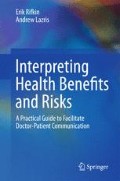Abstract
Dementia is a prevalent and devastating disease that often is difficult to diagnose and treat. There are 5.3 million Americans who have dementia diseases such as Alzheimer’s, and many seek treatment. Many Americans with dementia undergo extensive testing in search of a cause. Testing reveals a fully reversible cause in 3 out of 1,000 people tested. Many people with dementia also use dementia drugs to help symptoms, and it is felt that 92 out of 1,000 people who take such drugs may have some benefit when compared to placebo for up to a year, while 70 out of 1,000 suffer severe gastrointestinal side effects. Nevertheless, there continues to be confusion regarding the benefits of dementia screening and subsequent risks associated with medical intervention. Information presented to doctors and patients tends to be misleading and difficult to interpret. This is due, in large part, to the use of relative risks rather than absolute values when communicating information on dementia drug treatment. In light of this situation, a unique graphic, functioning as a decision aid, has been developed to enable physicians and patients to jointly assess the benefits and risks of dementia screening and eventual medical intervention. By characterizing the complexities of risk analysis in terms patients can understand, means they will be able to make well-informed decisions about their health.
Access this chapter
Tax calculation will be finalised at checkout
Purchases are for personal use only
References
iCasey, D., et al. (2010). Drugs for Alzheimer’s disease: Are they effective? Pharmacy and Therapeutics, 35(4), 208–211.
Mark-Clarfield, A. (2003). The decreasing prevalence of reversible dementias an updated meta-analysis. Archives of Internal Medicine, 163(18), 2219–2229.
Casey, D., et al. (2010). Drugs for Alzheimer’s disease: Are they effective? Pharmacy and Therapeutics, 35(4), 208–211.
Birks, J. (2006). Cholinesterase Inhibitors for Alzheimer’s disease. Cochrane Database Systematic Review (1).
Kavirajan, H., & Schneider, L. (2007). Efficacy and adverse effects of cholinesterase inhibitors and memantine in vascular dementia: a meta-analysis of randomised controlled trials. The Lancet Neurology, 6(9), 782–792.
Winblad, B., et al. (2001). A 1-year, randomized, placebo-controlled study of donepezil in patients with mild to moderate AD. Neurology, 57, 489–495.
Howard, R., et al. (2012). Donepezil and memantine for moderate severe Alzheimer’s disease. New England Journal of Medicine, 366, 893–903.
Rainer, M., et al. (2001). Cognitive relapse after discontinuation of drug therapy in Alzheimer’s disease: Cholinesterase inhibitors versus nootropics. Journal of Neural Transmission, 108(11), 1327–1333.
Petersen, R. C. (2005). Vitamin E and donepezil for the treatment of mild cognitive impairment. New England Journal of Medicine, 353(23), 2379–2388.
Geldmacher, D. S., et al. (2003). Donepezil is associated with delayed nursing home placement in patients with Alzheimer’s disease. Journal of American Geriatrics Society, 51(7), 937–944.
Schneider, L., et al. (2011). Lack of evidence for the efficacy of memantine in mild Alzheimer disease. Archives of Neurology, 68(8), 991–998.
Areosa, S. A. et al. (2005). Memantine for dementia. Cochrane Database Systematic Review (3).
Howard, R., et al. (2012). Donepezil and memantine for moderate severe Alzheimer’s disease. New England Journal of Medicine, 366, 893–903.
Searing L (2014) A daily dose of vitamin e may slow early Alzheimer’s disease,” the Washington post. January 4, 2014, p. E3. This study had an arm that looked at Memantine and showed no clinical improvement; Vitamin E did better in regard to ADL improvement.
Raina, P., et al. (2008). Effectiveness of cholinesterase inhibitors and memantine for treating dementia: Evidence review for a clinical practice guideline. Annals of Internal Medicine, 148(5), 379–397.
Qaseem, A., et al. (2008). Current pharmacologic treatment of dementia: A clinical practice guideline from the American college of physicians and the American academy of family physicians. Annals of Internal Medicine, 148(5), 370–378.
Lanctot, K., et al. (2003). Efficacy and safety of cholinesterase inhibitors in Alzheimer’s disease: A meta-analysis. Canadian Medical Association Journal, 169(6), 557–564.
Schwartz, L. (2012). How the FDA forgot the evidence: the case of donepezil 23mg. British Medical Journal, 344, e1086.
Gill, S., et al. (2009). Syncope and its consequences in patients with dementia receiving cholinesterase inhibitors. Archives of Internal Medicine, 169(86), 7–73.
Author information
Authors and Affiliations
Rights and permissions
Copyright information
© 2015 Springer International Publishing Switzerland
About this chapter
Cite this chapter
Rifkin, E., Lazris, A. (2015). Screening for and Treating Dementia. In: Interpreting Health Benefits and Risks. Springer, Cham. https://doi.org/10.1007/978-3-319-11544-3_18
Download citation
DOI: https://doi.org/10.1007/978-3-319-11544-3_18
Published:
Publisher Name: Springer, Cham
Print ISBN: 978-3-319-11543-6
Online ISBN: 978-3-319-11544-3
eBook Packages: MedicineMedicine (R0)

